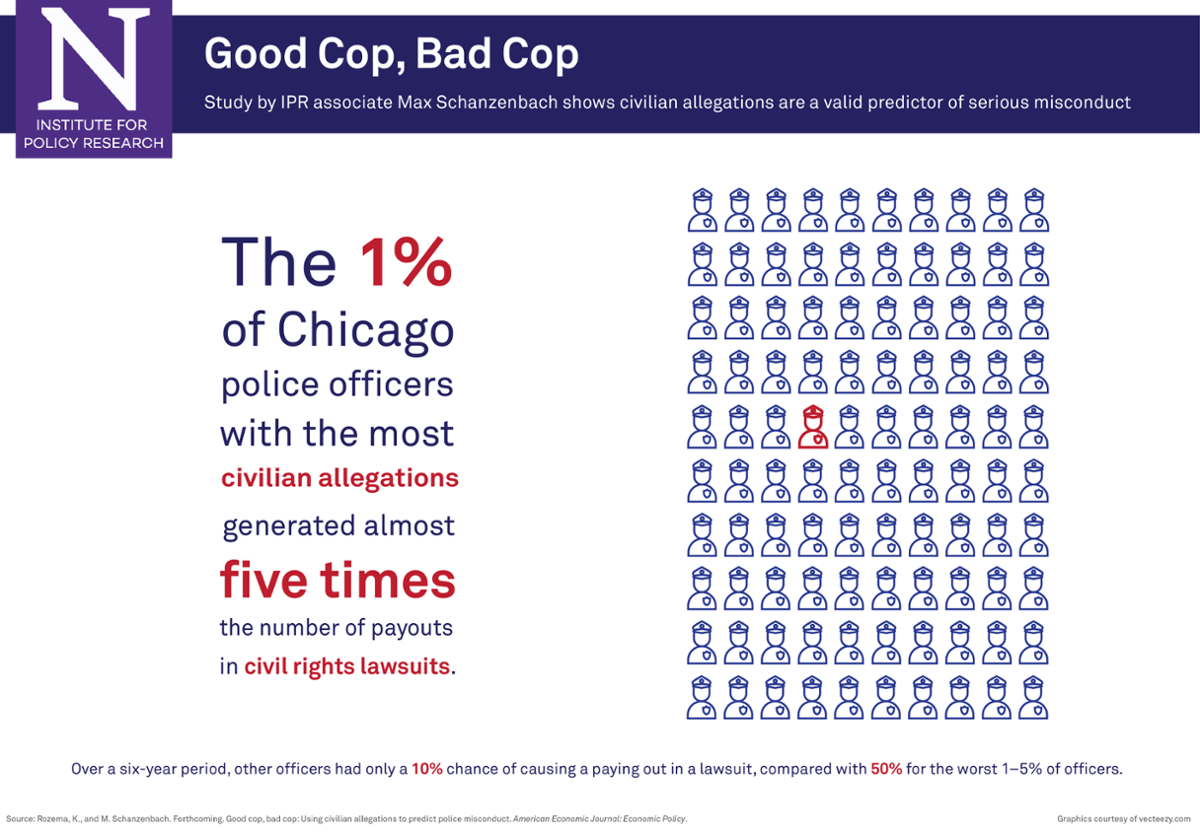Good Cop, Bad Cop?
Study finds civilian allegations can act as early warning system for serious police misconduct
Get all our news
When police officer Jason Van Dyke shot Laquan McDonald in 2014, he already had more than 20 civilian allegations lodged against him for police misconduct, dating back to 2000.
In a new study, two legal scholars examine whether civilian allegations can predict which police officers pose the highest risk for serious misconduct. Van Dyke’s allegation record placed him among the worst 3 percent of Chicago’s roughly 12,000 police officers, the study shows.
“The belief that a small number of officers are responsible for an outsized share of the problems is widespread and has been pointed to in media accounts and by independent panels dating all the way back to the horrific Rodney King beating in the 1990s,” said Max Schanzenbach, the Seigle Family Professor at Northwestern Pritzker School of Law. “But we establish this fact in a rigorous empirical fashion and further demonstrate that citizen allegations are a valid predictor of serious misconduct.” Schanzenbach is also a faculty associate at the University’s Institute for Policy Research.

Co-authored by Schanzenbach and Kyle Rozema, the Wachtell Lipton Fellow in Behavioral Law and Economics at the University of Chicago Law School, the study drew from several sources, including a dataset of 50,000 civilian allegations against Chicago police officers from 2002–2014.
The two researchers control for a variety of factors facing officers that can increase their chance of drawing a civilian allegation, in particular the risk inherent in their assigned police district. After adjusting civilian allegations for these factors, the researchers find that civilian allegations predict future civil rights litigation and payouts. Additionally, civilian allegations are related to other indicators of an officer’s misconduct, including off-duty misconduct and complaints from superiors.
These findings suggest that civilian allegations contain important information on officer conduct, and relying on them as part of an “early warning intervention system” could substantially reduce the most serious incidents of police misconduct.
“We estimate that removing the worst 1 percent, or around 120 Chicago police officers, from regular civilian contact—either by reassignment or termination—and replacing them with an average officer would have saved Chicago more than $6 million in payouts between 2009 and 2014,” Rozema said.
Schanzenbach and Rozema examined the potential for civilian allegations to predict serious police officer misconduct by linking personnel, allegation, litigation and payout data from four sources.
Their investigation led to three main findings:
- First, the study contradicts those who say some police officers collect more civilian allegations because they are either patrolling more dangerous beats or conducting more stops or arrests. The researchers not only control for an officer’s assignment but also track police officers when they changed districts. The researchers find that officers who had received more civilian allegations than their peer officers in one district also received more allegations than their peers when they move to a new district.
- Second, the study finds that for the vast majority of officers, civilian allegations are unrelated to civil rights litigation. But for the worst 5 percent, there was a clear relationship between allegations and litigation. The worst 1 percent of officers generate almost five times the number of payouts and four times the total damage payouts in civil rights litigation than the average police officer.
- Third, the study shows that allegations without a sworn affidavit from the civilian filing the complaint had the same predictive power as allegations with an affidavit. During the period under study, more than half of all civil allegations in Chicago were dismissed for failing to have a sworn affidavit from the accuser.
The findings have three key implications for policing. Cities should:
- Take civil allegations seriously, especially when there is a consistent pattern of allegations against particular officers, and devote resources to investigating them.
- Drop the requirement for a sworn affidavit if there is one, as it deters civilians from filing allegations.
- Make use of civilian allegations in personnel management, perhaps using them as part of an “early warning system” to target officers who receive considerably more civilian allegations than their peers.
Rozema and Schanzenbach emphasize that their study finds that the 90 percent of officers who receive no or just a few allegations do not need a targeted intervention. Only those officers in the worst 10 percent—and especially those in the worst 1 percent—merit special attention.
“Some commentators are worried that using civilian allegations in police discipline will ‘over deter’ officers—or make them pull back from pro-active policing,” Schanzenbach said. “Our results contradict this concern because receiving a few allegations should not place an officer under scrutiny. The results suggest that intervention should focus on a relatively small group of high-risk officers.”
For more information, see: Rozema, K., and M. Schanzenbach. Forthcoming. Good cop, bad cop: Using civilian allegations to predict police misconduct. American Economic Journal: Economic Policy. The complete working paper can be downloaded here.
View the full policy brief here.
Max Schanzenbach is the Seigle Family Professor of Law and an IPR associate.
Photo: Flickr, Ceyhun Jay Isik.
Published: October 4, 2018.
